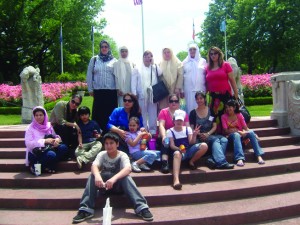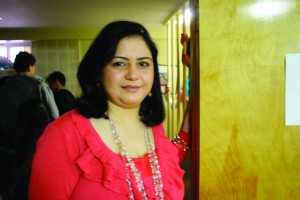When asked about her childhood in Afghanistan, Naheed Bahram will begin to speak, softly, her words stringing together sentences almost impossible to understand for those who have not seen lives torn apart by violence. The woman who now lives in Fresh Meadows will say, “I grew up in Afghanistan,” and then she will pause, briefly.
“I lost my mother in a bomb explosion in Kabul City,” she will say. “I was 9 years old at the time.”
She will go on, speaking about the rocket attacks that drove her from her home into Pakistan, of watching as the Taliban took over her country, of her father’s jewelry store in Afghanistan being bombed by extremists. She will speak about how her parents, who, despite being uneducated themselves, made sure their daughters and sons all went to school.
And she will say she always expected to return to the country of dramatic snow-capped mountains and a history of war – until she began working for Women for Afghan Women, a nonprofit that serves New York’s Afghan community – the heart of which is in Fresh Meadows and Flushing.
“I thought I would go back, but I realized I can serve my community here – and the needs are actually greater here, in Queens,” said Bahram, WAW’s program director who will speak about the role of women in Afghanistan and Islam at the Central Queens YM & YWHA in Forest Hills on Monday, April 15 at 1:30 p.m. “Women are more isolated here than in Afghanistan. In Afghanistan, they have the friends and family who they can turn to – often, here, they don’t know who they can turn to.”

The Women for Afghan Women’s ESL students with their children joined Naheed Bahram on a field trip to the Bronx Zoo.
But, more and more, Bahram, who moved to Queens with her husband in 2006, said women in the Afghan community have begun to seek help – with everything from immigration and citizenship issues to domestic violence – from the WAW, which also works with thousands of families in Afghanistan through such venues as domestic violence shelters, literacy classes and centers for children whose mothers are incarcerated.
“It’s a small and close community, so when they saw they could come to us with their issues with food stamps or housing or welfare, they began to trust us enough to come to us with other issues, like domestic violence,” Bahram said. “Domestic violence is huge in the community but isn’t talked much about. It took us a long time, almost 10 years, to earn that trust, but we’re getting there.”
Through word of mouth, including via information provided by imams at area Afghan mosques, outreach programs and such cultural events as the Afghan New Year celebration in March, women – as well as children – have started regularly going to the WAW, which served 903 families in 2012 – a huge increase over the 238 families just two years before in 2010.
“One of the biggest issues for Afghan women in Queens is culture shock,” Bahram said. “Afghans grow up in a very close environment, and most of these women get married and come to this country for their husbands, leaving behind their families. When they come here, they have to deal with a different culture, a different language – women are very isolated here.”
In addition to discussing WAW’s work in Queens and Afghanistan during her talk in Forest Hills, Bahram said she hopes to emphasize the difference between culture and religion – and what that means for Muslim women in both reality and public perception.
“People will mix up Islam with the Afghan culture,” she said. “Marrying your daughter really young, forced marriage, all of that – these are not things Islam tells you to do; this is culture. I’m hoping people who come to hear me speak with come away with that idea.”
Additionally, Bahram said she hopes to drive home the importance of the WAW’s work, as well as the evolution of women’s roles in an Afghan society that is undergoing monumental changes.
“There are improvements in Afghanistan – it’s not a hopeless cause,” she said. “An enormous number of girls are going back to school, women are in Parliament, the police and every aspect of life.”
Peggy Kurtz, a librarian and coordinator for the Central Queens YM & YWHA spring series, “Conversations with Outstanding Authors and Filmmakers,” echoed Bahram’s sentiments.
“The two issues of women in Afghanistan and women in Islam are of strong interest to many,” she said. “Nonetheless, most of us know very little about either topic, except through news stories. I think people will be interested to hear about both from a woman who has led as a human rights advocate for Afghan women.
“I also think people will be interested to learn about the Afghan community right here in Queens,” she continued. “These kinds of programs help to open the door, to foster a better understanding of our next-door neighbors in multi-cultural Queens.”
Bahram’s talk is open to the public, and a $6 voluntary donation is requested. More information is available at www.cqy.org by calling (718) 268-5011, ext. 151, or by emailing pkurtz@cqy.org
By Anna Gustafson


